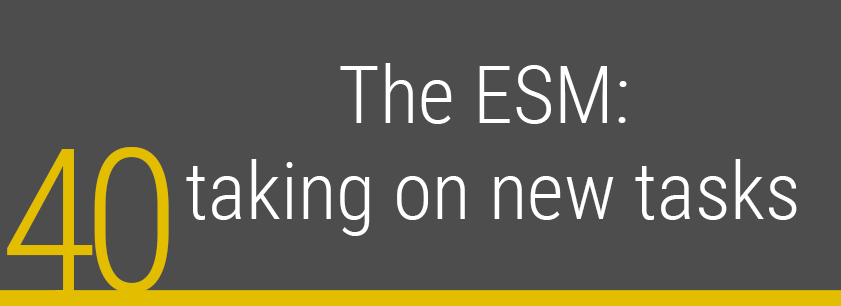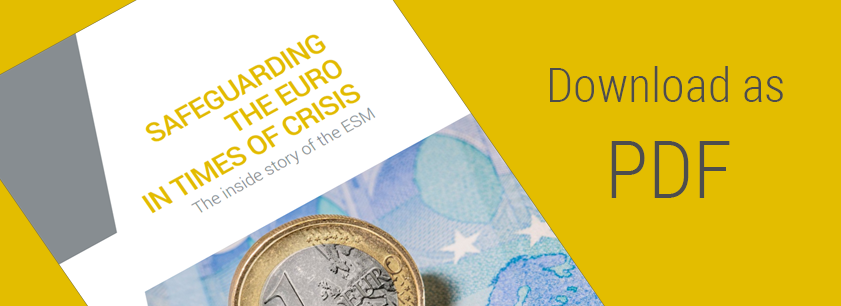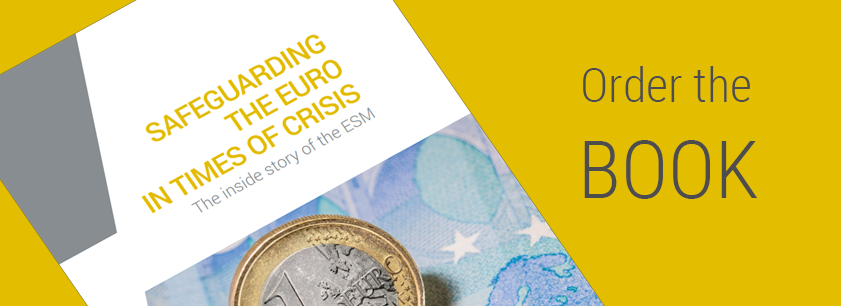39. Beyond the troika: the ESM’s evolving role
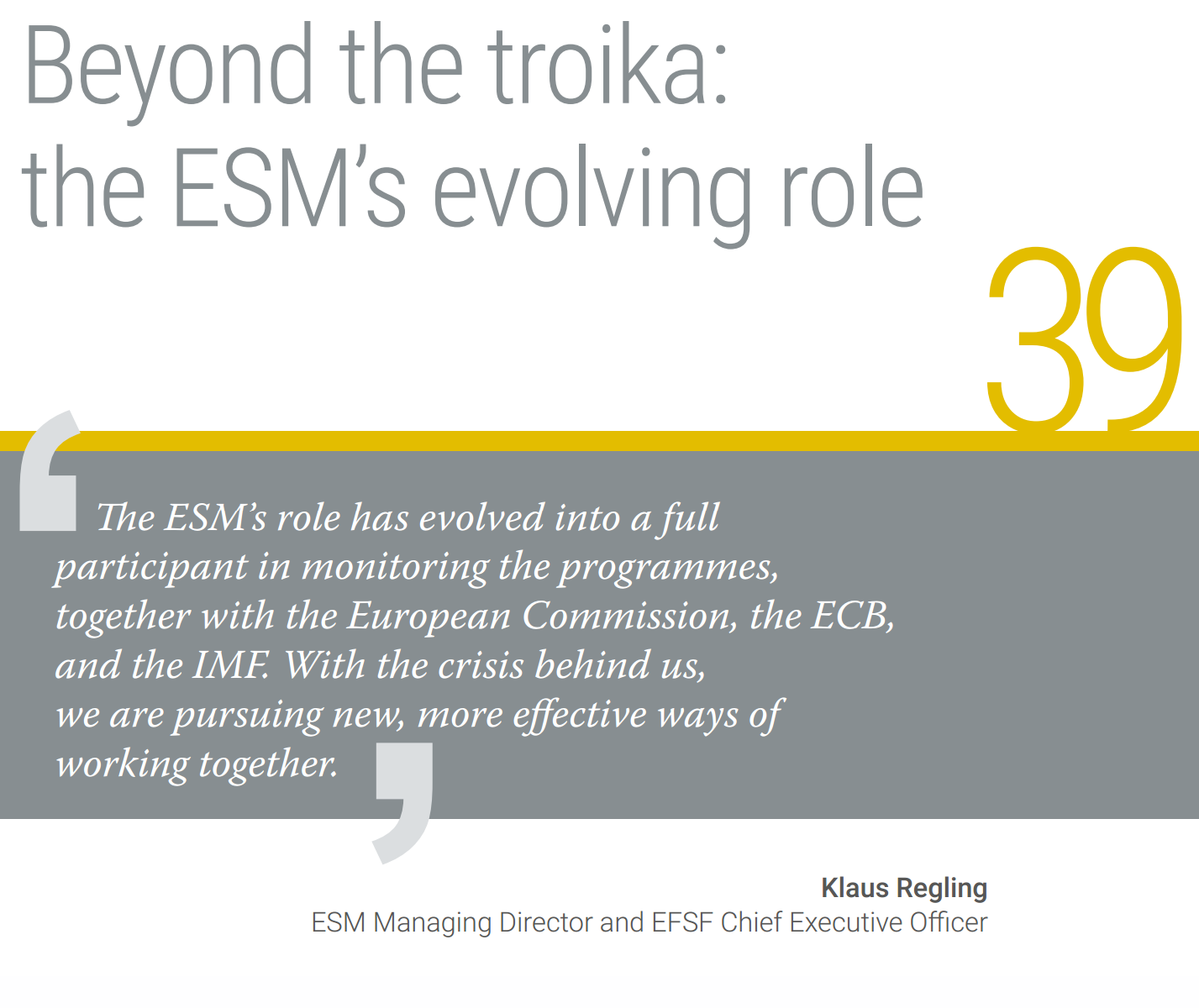
During the crisis, the ESM grew to become one of Europe’s established institutions with economic and financial expertise, offering a reliable safety net to the now 19 members of the monetary union. As the euro moves into its next stage of development, the firewall has earned its place at the table with its fellow international organisations.
The ‘troika’, as the initial group of three institutions was called, shared responsibility for preparing and monitoring the euro area rescue programmes. The European Commission worked closely with the ECB and the IMF to make sure the programmes would succeed.
As the ESM matured, it gained a seat at the crisis management table and it became an indispensable part of Europe’s financial safety net. The firewall has always been able to tap financial markets to make sure aid programmes have ready cash to disburse when called upon.
Furthermore, from the early days, the rescue funds have used their day-to-day knowledge of the financial markets to inform the effort to help countries regain market access.
‘What was first a troika, became a quartet. Despite occasional differences of opinion, cooperation was good,’ Managing Director Regling said in an op-ed for the Greek newspaper Kathimerini in August 2018 as Greece’s ESM programme came to a close[1].
The ESM has been part of an effort to strengthen debt management standards for the euro area. In setting up the permanent firewall, countries pledged that they would include uniform collective action clauses in their future bonds, in a move to ensure these clauses would be applied throughout the euro area and have an identical legal impact across all members. Such clauses are now standard, a change that happened quickly and efficiently after the requirement was made part of the ESM Treaty. The precedent set by the clauses has since been recognised as a key reference point by the Court of Justice of the European Union[2].
Through its funding and investment activities, constant contact with financial markets has made the ESM well placed to gauge reactions to the euro area’s crisis containment measures and to the reforms in borrowing countries. The firewall also has devised a system to monitor rescue loans over their entire lifetime, not just during the active phase of a rescue programme, in order to anticipate any repayment difficulties and to assess debt sustainability. The ESM also gained a strong knowledge of the banking sector, as banks played a critical role in every programme country’s crisis-fighting strategy. Taken together, these developments show the expertise the ESM has acquired since its creation.
Now, after the crisis, each of the institutions that fought the turmoil must assess and reflect on how it handled things. In the wake of this tumultuous period, each must decide how to prepare for the next disruption, which, inevitably and regrettably, will come someday.
As the euro enters its next era, the monetary union is reflecting on how it will work with the IMF going forward, how the ESM and the European Commission will best coordinate their roles, and how the Eurogroup sees the roles of the institutions evolving. On a parallel track, the ESM has led a drive of regional rescue funds to enhance cooperation with each other and with the IMF, thereby strengthening the global safety net.
Looking back, the ESM and its fellow institutions found that personal relationships were essential for getting through the toughest moments of the euro crisis. Regling, who had held senior posts at the Commission, the IMF, and the German finance ministry, knew many of the individuals involved personally. As a result, the firewall made a contribution from its earliest days: the Commission’s Buti said the EFSF quickly earned a reputation as an honest broker. ‘The troika was uncomfortable for everybody. Every institution was uncomfortable,’ he said. ‘It was good to have Klaus there to help discipline the discussions.’
The other institutions also faced a learning curve, requiring negotiators to find solutions whenever possible and a way forward when differences of opinion remained, said the IMF’s Lagarde.
‘The confrontation of views was sometimes difficult and awkward. And people did not like it so much. But equally it enabled, and it required, the settling of differences until and unless differences could not be settled, which has happened on occasion,’ Lagarde said.
A case in point was the argument between the Commission and the IMF over Greece’s long-term financial viability. The ESM was seen as a trusted source of debt projections that could be used to shape responsible policies, helping craft a new approach that was acceptable to all, said former German Finance Minister Schäuble.
‘It hasn’t reinvented the wheel, but it has provided high-quality, well-informed input. Of particular note is its analysis of sustainability using a market-oriented approach,’ Schäuble said.
Going forward, the ESM will inevitably take on a bigger role because of the global changes wrought by the last round of financial turmoil, said former US Treasury Secretary Geithner.
‘We now live in a world where the capacity of central banks to provide a protection against the extreme threat is much diminished,’ Geithner said. In his view, this is true of the US, Japan, and Europe but ‘it matters more in Europe because of the immaturity of the fiscal arrangements and financial arrangements. It’s likely to create more of a burden on governments and the collective funding mechanisms like the ESM.’
Within Europe, there’s also a hope that the euro’s rescue architecture can become strong enough to stand on its own. While the IMF’s knowledge base will always be a valued partner, the euro area might benefit if, in the next crisis, it does not need to turn to outside funding.
A more self-reliant euro area would be a very good development for Europe if the political outlook shifts in a way to make that possible, said the European Commission’s Verwey. ‘I don’t think it’s healthy for the continent to permanently depend on support from an international institution. The goal must be to become independent,’ Verwey said. ‘With all the experience we now have, with all the institutions we have established, we are close to the moment when we can let go.’
A turning point came in 2018, when the ESM and the Commission reached a new understanding of how they will work together, in times of calm as well as times of crisis. The new course of collaboration means ESM’s expertise will be put to broader use, following financing conditions not only in countries that have received aid, but also in countries outside the aid framework. In this way, the ESM will always be in position to work alongside the Commission to design a new programme on short notice, if needed.
‘The close collaboration between the Commission and the ESM in recent years has demonstrated that we can act successfully and with determination in the interest of the euro area in times of crisis’,[3] said Pierre Moscovici, European commissioner for economic and financial affairs, taxation and customs, when the move was announced. ‘By strengthening the foundations of our crisis management, we are sending a signal of confidence and stability.’
The agreement with the Commission took shape over the course of the year, beginning with a memorandum of understanding signed in April, laying out the foundations of the cooperation in line with how it had been evolved over recent years. As a result, the two institutions were also able to collaborate on a way forward, in light of the ESM’s broader mandate. Euro area finance ministers sealed the deal at their December meeting, welcoming the agreement and setting the stage for EU leaders to take the next steps in augmenting euro area oversight. The deal paves the way for the Commission and the ESM to make the most of their respective expertise.
‘We intend to work very closely together, particularly on debt issues and market access,’ Regling said.
To cement their cooperation, the ESM and the Commission will meet informally at least twice a year to share assessments and analysis of macro-financial risks. When it makes sense from a policy perspective, the ESM will also be invited to join Commission staff on their missions to member states[4].
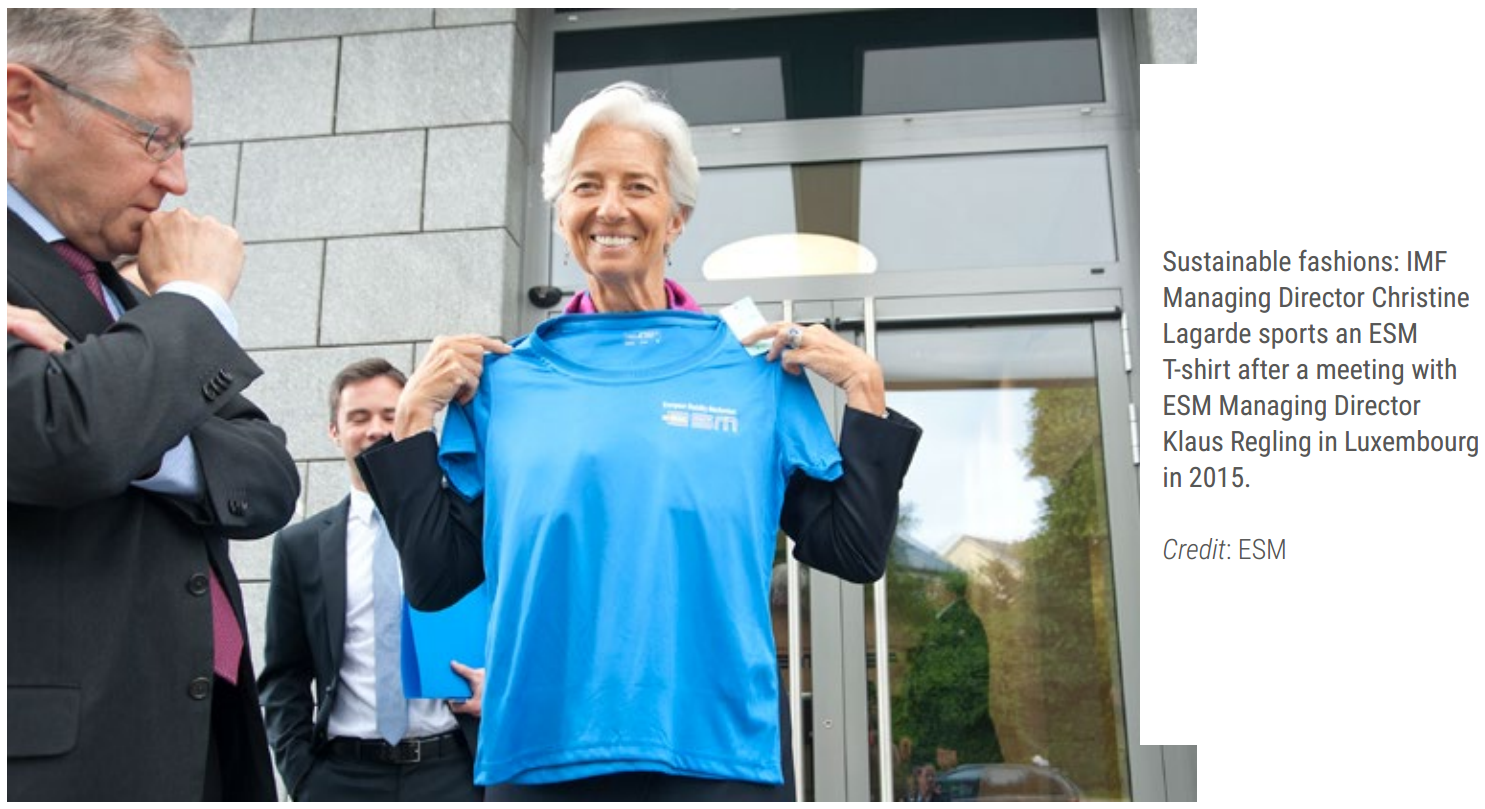
The two institutions also will work together to assess eligibility for precautionary credit lines, and to negotiate the aid conditions for any future assistance programmes. The ESM’s role will focus specifically on analysing market access for countries considering an aid request, and it will play a central role in preparing the debt sustainability analysis that accompanies the consideration of a potential programme.
The ECB will continue to play its role among the institutions, the finance ministers said in endorsing the ESM-Commission agreement. The euro area also will continue to work with the IMF, although its role is likely to be less prominent than during the early crisis years.
The ESM is working with other regional financing arrangements (RFAs) to develop best practices for working on their own and in collaboration with the IMF, in order to strengthen the global financial safety net[5]. Since October 2016, the RFAs have met annually at the IMF annual meetings, and they now engage in a regular dialogue throughout the year. The organisations also are working together on topics of common interest relevant to economic surveillance and crisis management. Shortly after its fifth anniversary in October 2017, the ESM signed formal agreements to reinforce collaboration in areas of common interest with Fondo Latinoamericano de Reservas (FLAR) and with the Association of Southeast Asian Nations+3 Macroeconomic Research Office (AMRO). Also in 2017, the IMF published its own policy on how it will exchange documents with the regional organisations.
The ESM and four of its fellow RFAs called for a more formal set of guidelines for how the IMF will work with the regions going forward, in an October 2018 joint discussion paper[6]. Such a framework could be particularly helpful in areas such as training, capacity building, and information sharing. The RFAs endorsed the IMF’s proposal of a generally flexible approach to future collaboration, given the differences in activities and missions in each regional institution’s part of the world. But they said that more details might be helpful in selected areas, such as how collaboration would work in ‘the run-up to the crisis period’ and how a regional institution might function as the lead agency on a rescue programme. The more planning takes place in non-crisis periods, the better the response will be when urgent action becomes necessary.
‘The resolution of the euro area debt crisis provided a new field to test the collaboration between the regional institutions in Europe and the IMF,’ the discussion paper said. The IMF worked hand in hand with the EU and the euro area on rescue design and aid negotiations, and also joined forces for reviews during and after aid programmes. The report said: ‘Overall, this in-crisis collaboration worked well. However, it also shed light on the areas that would require future improvement.’
The IMF is also in the process of weighing its options. Lipsky, who was the IMF’s deputy managing director and then acting managing director in the early phase of the crisis, said the euro area now has a rescue apparatus that could be rapidly expanded in an emergency. ‘There’s not a reason in the world, objectively, why Europe should need IMF funding to support a specific Member State,’ Lipsky said. There might be a political need for the IMF to put some of its own funds on the line as an endorsement of Europe’s efforts, but ‘in objective terms, I can’t see – except in the most exceptional circumstances – that there would be a need in the future for IMF funding in the euro area.’
This approach reflects a change in outlook among the IMF membership over the course of the crisis. As the euro crisis neared its peak, the international lender came under pressure from its non-European members to limit its lending to wealthy euro area countries, and divisions over Greece led it to scale back further the prospect of additional lending to that country. This backlash over the IMF’s successive – and successively smaller – interventions in Europe has changed the outlook for future cooperation, particularly now that Europe has a robust permanent firewall.
The joint discussion paper from the RFAs highlights the political advantages of working with the IMF. In some cases, regions ‘may need to rely on the IMF to alleviate moral hazard risks given that IMF lending tends to come with policy adjustment.’
This view is shared by many ESM Members. ‘The IMF’s involvement in the completed programmes for Ireland, Cyprus, and Portugal clearly improved the quality of the programmes. These successes speak for themselves,’ Schäuble said. ‘It is also better for Greece if its transformation into a more robust economy is supported by the IMF. In Germany, the IMF’s participation increases political support for the Greek rescue package.’
Former programme countries are less keen, however, as they view the IMF to be overly focused on financial targets and not sufficiently sensitive to the wider economic and social impact of economic reforms. Greece welcomed the IMF for its first rescue programme, in 2010, before a euro area support mechanism existed. By 2015, when Greece was negotiating the third programme with the permanent ESM, many Greeks saw the IMF as unduly critical and out of touch. When asked if popular acceptance of the programme was made easier because the IMF didn’t participate financially, Greece’s Stournaras said: ‘Yes. Absolutely.’
The Eurogroup has sought to take stock of the range of views among its membership and of the ESM’s overall performance in its first years of existence. To this end, it commissioned an evaluation conducted by former Austrian central banker Gertrude Tumpel-Gugerell, a member of the ECB’s Executive Board from 2003 to 2011. The evaluation was released in mid-2017 after more than a year of work.
The report said the ESM should urge countries that are requesting aid to take stronger ownership of required conditions, in order to make aid programmes more credible[7]. It said rescue programmes should be built with clear objectives and priorities in mind, so that beneficiary nations can return to market financing and adopt structural reforms on a practical schedule, and it said countries might benefit from seeking programmes earlier. ‘The ESM should pre-empt delays in programme requests when problems cannot be effectively solved at national level,’ the report said.
These recommendations cut across the wide range of public sentiment over when and how aid requests are appropriate. As Germany’s Schäuble said, countries should avoid requesting aid unless they are truly in dire straits, and in general ESM aid is granted only as a last resort. Likewise, countries in trouble may not want to seek aid until they are sure they have exhausted every possible alternative.
‘No government, no people would go for an adjustment package willingly. That is something I’ve seen,’ Malta’s Camilleri said. ‘The cycles of all the different countries undergoing these adjustment packages – I mean, none of them walked in and signed on to a package very, very willingly. They all took great, great pains to avoid it, so let’s not fool ourselves. I haven’t seen one single country gallivanting wanting to go into some adjustment programme.’
But, once a country is on board with a programme, its reforms and helping hand can make a big difference. For example, Ireland won praise for accepting responsibility and embracing the necessary reform, said Giammarioli, the ESM’s head of strategy and institutional relations, who was the rescue fund’s Ireland country coordinator from 2013 to 2015.
In contrast, Greece faced a different set of constraints in combatting a crisis of a different magnitude. According to Greek Finance Minister Tsakalotos, Greece took some actions it strongly believed in, some it was unsure about, and some that were imposed on it by the international authorities. Because of the severity of Greece’s problems, it had no choice but to comply even when it disagreed with the chosen policy, he said. ‘If I was not a minister of finance of an indebted country, I would have done things differently. In my view, that would have been more socially just and actually more economically efficient.’
All of these experiences have contributed to the euro area’s next steps in mapping out its crisis-fighting system. The working methods within what are now widely called ‘the institutions’ will continue to adapt to euro area needs, while also serving as an example of IMF cooperation with regional organisations worldwide.
Lipton, the first deputy managing director of the IMF, said: ‘I see it as a very valuable, new and imaginative collaboration and interaction, and think that we’ll all be evaluating how that’s worked, and how it might best work in the future, and how lessons from our interaction with the ESM could be used in shaping good modes of cooperation with other institutions and other regions.’
Continue reading
[1] Kathimerini (2018), ‘Op-ed by Klaus Regling’, Online article, 19 August 2018. https://www.esm.europa.eu/interviews/op-ed-klaus-regling-kathimerini-greece
[2] CJEU (2018), ‘Judgment in Case C-308/17 Leo Kuhn v Hellenic Republic, Press release, 177/18, 15 November 2018. https://curia.europa.eu/jcms/upload/docs/application/pdf/2018-11/cp180177en.pdf
[3] ESM (2018), ‘European Commission and European Stability Mechanism lay down principles of cooperation’, Press release, 27 April 2018. https://www.esm.europa.eu/press-releases/european-commission-and-european-stability-mechanism-lay-down-principles-cooperation
[4] ESM (2018), ‘Future cooperation between the European Commission and the European Stability Mechanism,’ 14 November 2018. https://www.consilium.europa.eu/media/37324/20181203-eg-1b-20181115-esm-ec-cooperation.pdf
[5] Arab Monetary Fund, AMRO, Eurasian Fund for Stabilization and Development, European Commission, ESM, FLAR (2018), ‘IMF-RFA collaboration: Motives, state of play, and way forward: A joint RFA staff proposal’, Discussion Paper 4 – special issue, October 2018. https://www.esm.europa.eu/sites/default/files/esmdiscussionpaper4.pdf
[6] Ibid.
[7] Tumpel-Gugerell, G. (2017), EFSF/ESM financial assistance: Evaluation report, Publications Office, Luxembourg. https://www.esm.europa.eu/sites/default/files/ti_pubpdf_dw0616055enn_pdfweb_20170607111409_0.pdf
